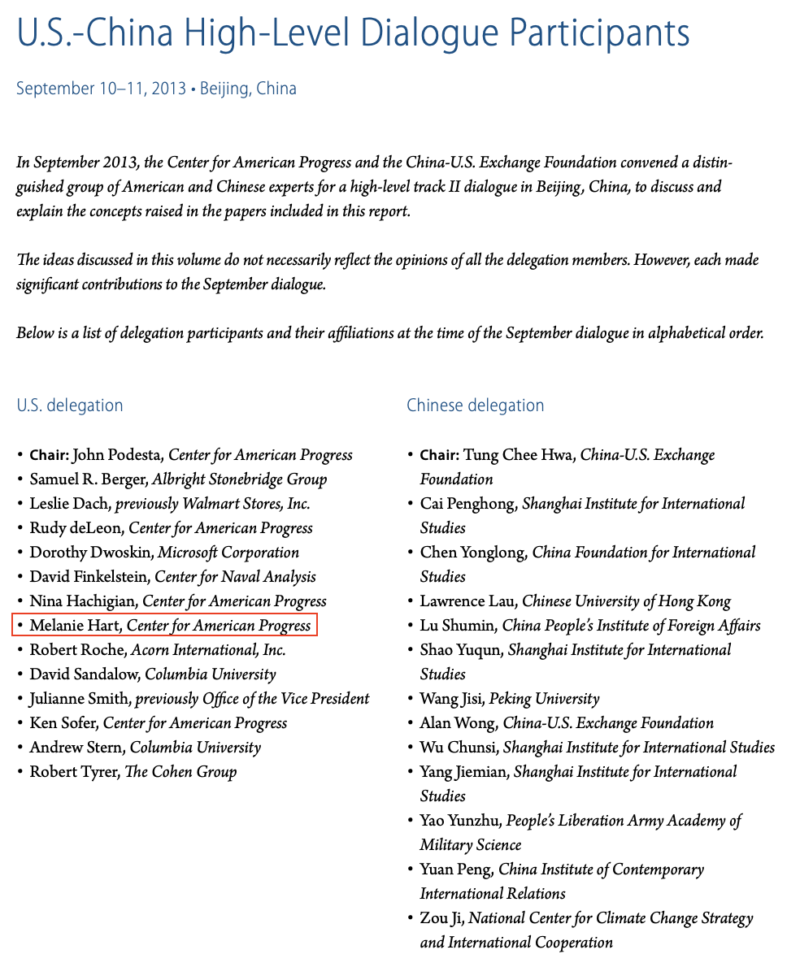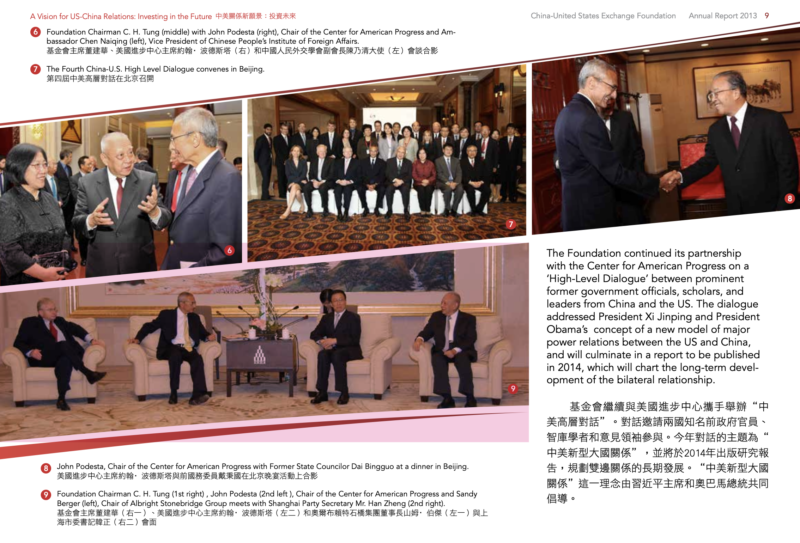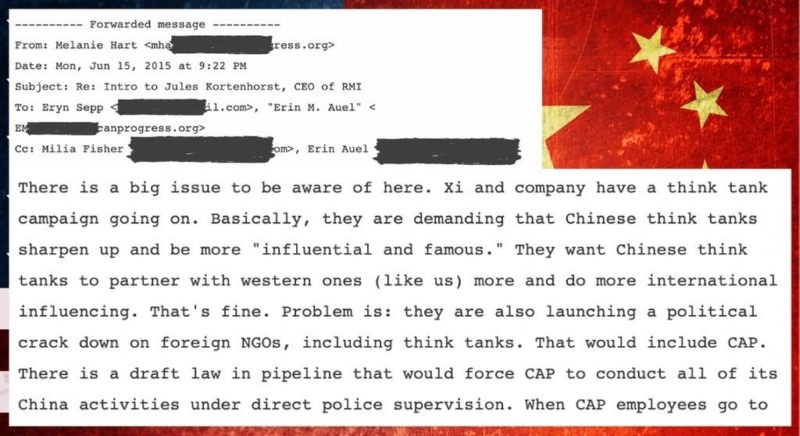EXCLUSIVE: Biden’s China Chief Said She Was “Fine” With The CCP Spreading Influence In America And Pre-Briefed Communists Ahead Of A Major Summit.
The latest addition to President Biden’s China team, Melanie Hart, participated in programs and authored reports sponsored by a leading Chinese Communist-backed propaganda organization seeking to “influence foreign governments to take actions or adopt positions supportive of Beijing.”
23 February, 2021
Emails also reveal Hart saying she is “fine” with Chinese think tanks broadening their “international influencing” in the United States. She has also secretly provided Chinese Communist Party Premiers with questions ahead of conferences.
Hart’s newfound post as China Policy Coordinator to the Undersecretary of State for Economic Growth, Energy and the Environment will allow her to “oversee a review of Trump administration policies.” Bloomberg notes she’ll focus on the Trump team’s “Clean Network” Initiative, which encouraged countries to block Huawei, a controversial and compromised Chinese Communist Party-linked telecommunications company, from 5G networks.
Hart’s past, however, casts her as an unlikely figure to be tough on Beijing.
Communist Cash.
In 2013, Hart took a trip sponsored by the China-United States Exchange Foundation (CUSEF) to Beijing as part of a Center for American Progress (CAP) delegation.
Hart, who served as the Director of China Policy and a Senior Fellow at CAP, a think-tank with major influence during the Obama years, traveled to the communist country for an annual “U.S.-China High-Level Dialogue.”
The September event convened to discuss the findings of a 110-page CAP report entitled “Toward a New Model of Major Power Relationship,” which urged closer financial ties and military collaboration between the two countries. Among the Chinese Communist Party-linked attendees were academics from state-run universities and think tanks including the People’s Liberation Army Academy for Military Science.

“Officials and experts in both countries need a more effective dialogue with their citizens on the importance of the U.S.-China relationship and what new- model relations exercise is designed to prevent and achieve,” the CAP report encouraged.
Hart, a Senior Policy Analyst at the time, also earned a special shoutout in the report for her “contributions” to the effort:
The National Security and International Policy team at the Center for American Progress authored this paper in preparation for the September 2013 CAP-CUSEF High Level Dialogue in Beijing, China. The team would like to acknowledge contributions by Senior Vice President Rudy deLeon, Senior Fellow Nina Hachigian, Senior Policy Analyst Melanie Hart, Policy Analyst Ken Sofer, and intern Luke Herman on this report.
A 2013 CUSEF promotional brochure boasting about the event also reveals the delegation met with several Chinese Communist Party apparatchiks including state-run think tank leaders, State Councilors, and Party Secretaries.

This was not an isolated incident.
In 2015, emails sent to John Podesta contained attachments revealing an itinerary and primer for a March “CAP-CUSEF High Level Dialogue” in Beijing.
The 236-page document listed Hart as a delegation attendee alongside failed Democratic presidential candidate Tom Steyer and Vikram Singh, a Senior Advisor to Biden Secretary of State Antony Blinken’s controversial WestExec consulting firm.
Hart was scheduled to speak alongside Steyer on the subject of “climate change and energy” at the dialogue, evidenced in the document below:
‘Co-opt and Neutralize’.
CUSEF was founded by the Vice-Chairman of the “highest-ranking entity overseeing” China’s United Front, which the U.S.-China Security and Economic Review Commission identifies as seeking to “to co-opt and neutralize sources of potential opposition to the policies and authority of its ruling Chinese Communist Party” and “influence” entities such as “foreign governments and other actors to take actions or adopt positions supportive of Beijing.”
Aided by Western lobbying firms, CUSEF has set out to “effectively disseminate positive messages to the media, key influencers and opinion leaders, and the general public” regarding China, according to Foreign Agent Registration Act (FARA) filings with the Department of Justice.
The National Pulse has previously revealed CUSEF sponsoring trips to China for mainstream corporate media outlets in exchange for “favorable coverage” and for current and former elected U.S. officials.
Follow the E-Mails.
In 2015, CAP also contemplated attending the state-sponsored China Center for International Economic Exchanges (CCIEE) Fourth Global Think Tank Summit.
In an email exchange with CAP personnel ahead of the trip, Hart reveals she is “fine” with Chinese think tanks partnering with “western ones (like [CAP])” to do more “international influencing” before noting the government crackdown that would “force CAP to conduct all of its China activities under direct police supervision”:
“Basically, they are demanding that Chinese think tanks sharpen up and be more “influential and famous.” They want Chinese think tanks to partner with western ones (like us) more and do more international influencing. That’s fine…”

Despite concerns expressed in the e-mail above, a June press release authored by Hart for the CAP website shows the think-tank and Hart ultimately attended the summit.
Before it began, delegation member John Podesta was one of four summit-wide attendees selected to ask Premier of the State Council Li Keqiang a question.
An email thread reveals CAP fellows and delegation members discussing the question—an effort that appeared to be spearheaded by Hart.
Hart shared the final draft of the question before noting she’d forward the question to “Premier Li’s team” so they “can get to work figuring out how to answer.” In other words, their U.S. delegation sent questions in advance in order to placate their Chinese Communist counterparts:
“As you know, 2015 presents an historic opportunity for the international community to reach ambitious new agreements on the intertwined global challenges of climate change and sustainable development. Increasing financing for sustainable development and decreasing financing for projects that add considerable climate risk will be essential if we are to achieve our global development and climate change goals. That will require applying high environmental and social standards to our investments going forward. China will host the G20 next year in the midst of a growing international dialogue on sustainable investment standards. What is China’s strategy for leveraging the G20, the Asian Infrastructure Investment Bank (AIIB), the South-South Cooperation Fund, the Silk Road Fund, and other bilateral and multilateral forums to help establish common global standards in financing for sustainable development?
“I’ll hold until 11:00pm tonight in case folks have additional thoughts/edits. If no one pipes up with additional changes I’ll send this version out at 11pm tonight. (Then Premier Li’s team can get to work figuring out how to answer.)”
Blood Money.
Hart’s professional bio also reveals that she “worked on Qualcomm’s China business development team, to provide technology market and regulatory analysis to guide Qualcomm operations in Greater China.”
She also “worked as a China advisor for the Scowcroft Group, Albright Stonebridge Group (ASG), and the University of California Institute on Global Conflict and Cooperation.” ASG, which employed several other Biden team members such as nominee for Ambassador to the United Nations Linda Thomas Greenfield, consults extensively for the Chinese government and retains its officials as advisers.
During Hart’s years at CAP as Director of China Policy and a Senior Fellow, the think tank also had a robust relationship with CUSEF spanning over a decade.
Since 2009, CAP, which counts its former president Neera Tanden as Biden’s pick to lead the Office of Management and Budget, has sent delegations to China as part of a CUSEF program.
Brochures from the Chinese government-linked organization reveal CAP delegations have discussed “a wide range of issues including geopolitical cooperation, military-to-military collaboration, climate change, energy security, trade balance, and the global financial crisis.”
“Both countries now must exhibit commitment and determination to build a positive, cooperative, and comprehensive China-US relationship for the future,” a summary of remarks from delegation leader, Obama adviser, and Chief of Staff to President Bill Clinton John Podesta reads.
On Thursday, the Senate Health, Education, Labor and Pensions (HELP) Committee will hold a nomination hearing for Dr. Rachel Levine, President Joe Biden’s pick for Assistant Secretary of Health at the Department of Health and Human Services (HHS). There are plenty of reasons for the committee to be concerned about placing Dr. Levine in such an influential and powerful role.
https://thenationalpulse.com/analysis/schweppe-bidens-hhs-pick-advocates-sex-changes-for-kids/




No comments:
Post a Comment
Note: only a member of this blog may post a comment.